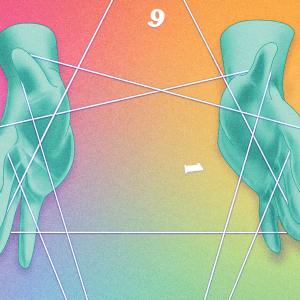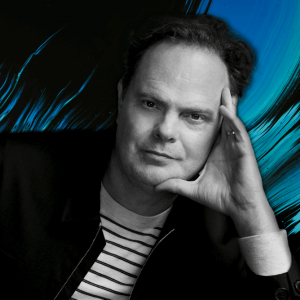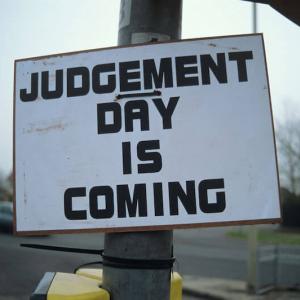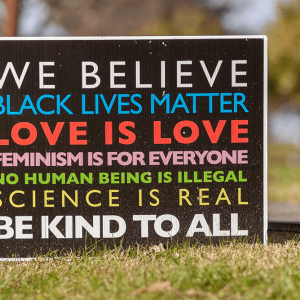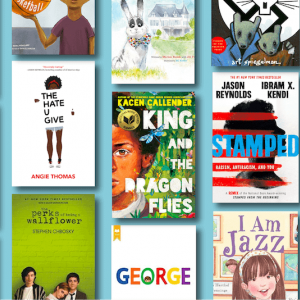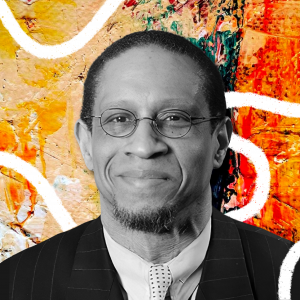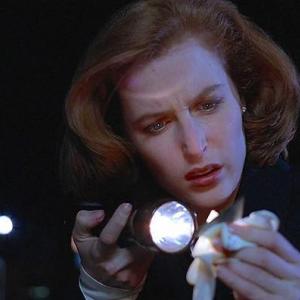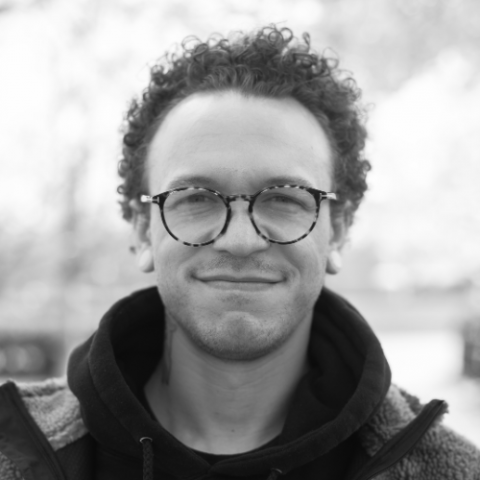
Josiah R. Daniels (he/him) is the associate opinion editor at sojo.net. He is a native of the southwest suburbs of Chicago, but currently resides in the Pacific Northwest with his wife.
The first thing Josiah ever wrote was a devotion for his youth group when he was 13. And while that devotion was never published (this is for the best), it did solidify his love for writing. His writing centers around race, politics, and religion. His other interests, such as hard bop and avant-garde jazz, sci-fi, cults, and the Hebrew Bible, also appear in his writing. Josiah has written for Geez magazine, The Bias Magazine, Religion Dispatches, and Sojourners, which has been Josiah’s favorite magazine since his college days. NPR’s Weekend Edition interviewed him about a piece he wrote criticizing an ad campaign’s effort to rebrand Jesus.
Josiah lived on Chicago’s West Side for three years. There, his neighbors taught him the importance of integrating faith with direct action, a lesson that continues to influence him today.
When not reading, writing, or collaborating with authors, he is watching the Chicago Bulls, playing basketball, or taking full advantage of his PBS Passport membership. An atonal X user, he can be found @josiah_Rdaniels.
Posts By This Author
Can the Enneagram Make Us Better Christians?
IN 2011, I took a course at my Christian college about the personality type system known as the Enneagram.
The Enneagram is a system built around nine personality types, with each type providing a unique perspective on how we navigate our relationships, emotions, and the world around us. The Enneagram draws on both spirituality and psychology, which distinguishes it from many other personality indicators.
A primary question that emerged for me from that college class: Does the inner work that the Enneagram encourages manifest itself in the outer world through justice work, or is the Enneagram primarily a tool meant to encourage people to focus on individual healing, career, and spirituality?
Throughout history, questions about how and why each human has a unique set of behaviors, motivations, emotions, and cognitions have preoccupied philosophers, psychologists, sociologists, religious thinkers, and Buzzfeed quiz creators alike. Indeed, in the 21st century, “know thyself” is less of a thought-provoking ancient Greek aphorism and more of a cultural imperative lauded by the self-help industrial complex and career coaches. We are assured that by unlocking our “true selves,” we will ultimately be unlocking our true potential, which will drastically improve our fortunes.
But the Enneagram was never meant to simply measure our potential or provide a definitive answer to the question of human personality. This is contrary to some of the most popular personality indicators such as Myers-Briggs or CliftonStrengths (formerly StrengthsFinder), which became popular because they promised to help employers tap into human potential and productivity. The Enneagram originated as a tool for contemplation but has come to emphasize how self-growth and inner work prepare us for the outer work of building community.
daniels.enneagram.inline1.jpg
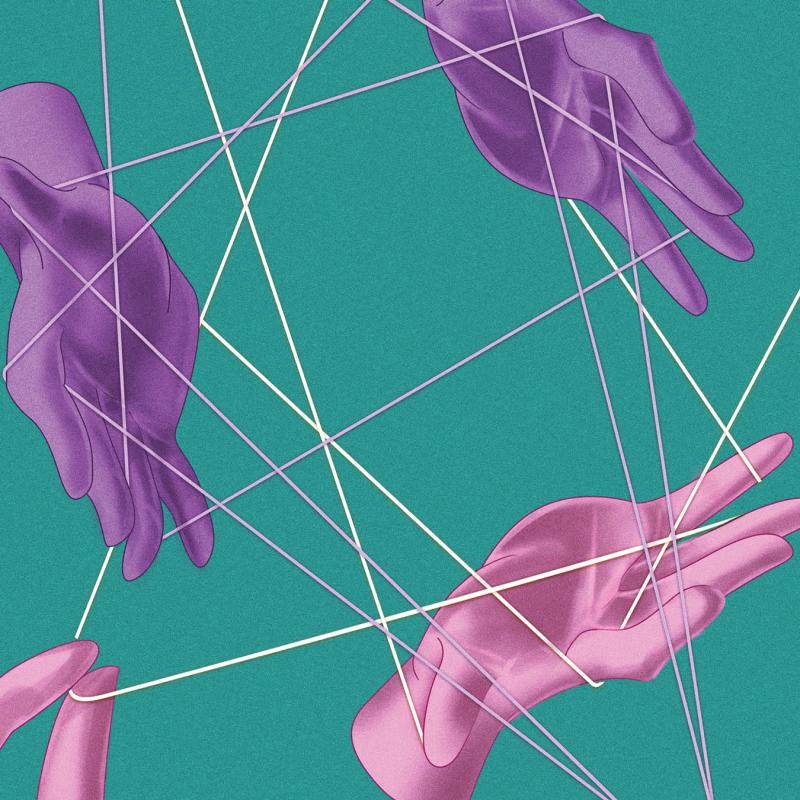
In their book The Enneagram: A Christian Perspective, Catholic priest Richard Rohr and Lutheran minister Andreas Ebert point to a 4th-century Christian Desert Father, Evagrius Ponticus, as the first to use, loosely, the nine-pointed symbol to highlight vices that he believed interrupted one’s inner peace and relationship with God. But it wasn’t until the 1970s that Chilean psychiatrist Claudio Naranjo, inspired by a theory originated by Bolivian philosopher Oscar Ichazo, used modern psychology to develop a theory of nine distinct personalities — or “enneatypes” — that highlighted the vices, virtues, and core motivations of each type.
The Enneagram is sometimes treated as just another personality test that can help us purchase the things that “match” our personalities, find romance, or unlock our “true potential” so we can make more money — part of our culture’s obsessive focus on self-improvement. But at its best, the Enneagram not only emphasizes making peace with yourself and a higher power, it also offers tools for learning how to be in community and build a more just society.
To help me sort through my questions, I interviewed three Enneagram experts: Chichi Agorom, an associate faculty member with The Narrative Enneagram and author of The Enneagram for Black Liberation; Jessica Denise Dickson, a life empowerment coach and Enneagram guide who uses the Enneagram in anti-racist workshops; and Abi Robins, a queer, trans Enneagram teacher, coach, and author of The Conscious Enneagram. Their responses have been edited for length and clarity. — Josiah R. Daniels
Rainn Wilson of ‘The Office’ Wants a Spiritual Revolution
I don’t know what shocked me more: The fact that actor Rainn Wilson — best known for his role as Dwight Schrute on the hit TV show The Office — had written a book about religion and spirituality or that I was able to interview him.
I am a millennial and for many of us, “spirituality” means being “spiritual but not religious.” I’ve heard my peers say things like, “I’m looking for spiritual healing,” or “I’m trying to find God for myself,” or “I’m wanting to get in touch with my own divinity,” or “I contain multitudes.” Perhaps there’s a kernel of truth in some of those statements but the thing that stands out to me is this: It kinda just comes off as individualism baptized in “holy” hyperbole.
What I appreciated about Wilson’s Soul Boom: Why We Need a Spiritual Revolution (out April 25) is that it offered a gentle critique of this version of individualized spirituality. For Wilson, who is a member of the Baha’i faith, spirituality has a larger purpose beyond the self. Spirituality gives us eyes to imagine a society based on “justice, equity, love, and a reduction in unnecessary pain for the inhabitants of our beautiful planet. To build the kingdom of God on Earth,” as he writes in the book. So, from this perspective, seeking inner peace should not only lead to spiritual tranquility but also public tranquility. If this is what pure and undefiled spirituality might look like, then color me intrigued.
Wilson and I talked about topics ranging from cultural appropriation and Christian representation in the media, to communism and how religion is portrayed in The Office. Considering all the topics touched on in Soul Boom, it only seemed right to cast a wide net during our conversation.
What ‘He Gets Us' Ads Get Wrong About Jesus
When I first noticed the ads on TV last March, I was cautiously optimistic. Each ad features an array of black-and-white photos with people in contemporary settings followed by a simple, relatable slogan on a plain black screen: “Jesus was wrongly judged,” “Jesus suffered anxiety, too,” “Jesus struggled to make ends meet, too;” each ad ends with the campaign’s tagline, “He get us. All of us.”
Olúfẹ́mi O. Táíwò Reconsiders ‘Centering the Marginalized’
“Centering the marginalized” is common parlance among both Christian and secular social justice advocates. This especially makes sense for Christians, as it was Jesus who said, “the last will be first, and the first will be last” (Matthew 20:16). So when it comes to seeking justice, it makes sense that we’d try to prioritize the experiences and perspectives of those our society discriminates against because of religion, race, gender, sexual orientation, or other identities. But two examples from this past year have made me doubt the viability of an identity-based approach for pursuing social justice.
How My Conservative Christian College Made Me a Leftist
My school tried to purge any evidence of liberation theologies, Christian critiques of the economy, or radical solidarity with the poor, hoping to indoctrinate students with a conservative ideology. But there was an underground community at my school that helped me make a pivotal realization: By Christian college standards, Jesus would be labeled “an extreme leftist” because he embodied class solidarity with the poor, damned the rich, and imagined an alternative community. That gospel appealed to me in college; it still appeals to me today.
Julian Davis Reid Teaches Us to Rest in Jazz
Core to Christianity is this notion of hospitality and trying hard to hear your neighbor, hear what they’re trying to say, and even giving voice to what they’re trying to say. And you may not always agree with the melody. But part of what we see Jesus do is pay attention to the fact that every person in front of him has a melody that God’s given them.
The Apocalypse Isn’t All Doom and Gloom
For those who have lost loved ones due to COVID-19, racist violence, or gun violence, Jesus’ apocalyptic hope that “the world as such” comes to an end is, perhaps, relatable. Here in the United States, we are expected to numb ourselves to the death-for-profit economy that’s been established; we are expected to go on with business as usual, never once pausing to cry out in judgment, “Woe to the world.”
Fewer Kitschy Creeds, More Good Reads
My shtick on Twitter is taking pictures of myself with kitschy signs that I find wherever I go. You know the signs I’m talking about. They are the signs that embody the motto of “Live. Laugh. Love.” If you go to your local Hobby Lobby, there is an aisle dedicated to this, um, décor.
Shrieking Toward the Sky for the Kids Who Have Died
It has been hard to read any of what has been written about the mass shooting in Uvalde, Texas. At some point, you start to wonder if we have convinced ourselves that words speak louder than actions.
Hey IRS, Jesus Is My ‘Third Party Designee'
On the IRS Form 1040, there is a section titled “Third Party Designee” which asks, “Do you want to allow another person to discuss this return with the IRS?” When filling out my 1040 for 2021, I simply wrote, “Jesus paid it all, all to him I owe.” This is what people mean when they say, “let go and let God,” right?
Win Some, Lose Some
Do you ever just need a win? Have you ever just had the blues of the world hit you, causing you to stop and think to yourself, “I need something good right now or I’m gonna lose it”? Where do you normally turn? Perhaps you go outside, maybe you talk with some friends, or maybe you find comfort in literature and movies. These are better attempts to find some modicum of happiness than to look where I normally look: The world of sports.
We Asked Kids To Review Banned Books
We are currently in the midst of what the American Library Association condemned in November as “a dramatic uptick” in efforts to challenge or remove certain books from libraries and schools. Many of these censorship efforts have been led by conservative Christians and conservative politicians who are concerned these books will dissuade their kids from embracing what they call “Judeo-Christian values.” But as Ryan Duncan explained, Christians are deluding themselves if they believe banning stories about gender, race, or sex will halt their kids’ curiosity. Ban ’em or burn ’em, these books will not disappear and kids will continue to seek out resources on these topics — to some parents’ chagrin.
Obery Hendricks Thinks Marxist Analysis Can Help Christians
With scholarly precision and an ability to engage beyond the tired critiques of right-wing Christianity, Hendricks imagines a version of Christianity that is politically committed to social justice. Whether it is through his experience growing up in the Black church, his commitment to the revolutionary nature of Jesus’ teachings, or his insistence that leftist politics and Christianity can inform one another, Hendricks demonstrates the beauty of the Christian faith.
What ‘The X-Files’ Taught Me About Belief
I began to watch the show due to my love of sci-fi but the reason I finished all 218 episodes and remained faithful even throughout the 2016 reboot is because of Dana Scully. There’s not a more complex TV character than Scully: She is a medical doctor who knows karate and although she openly antagonizes her partner, Mulder, for placing stock in supernatural explanations instead of logical ones, she openly identifies as Catholic. Scully’s complexity gets to the heart of what the show is all about: the desire to believe.
Consider the Weeble: What Our Editors Are Reading
It’s certainly ironic, but as much as the news can get me down it can also lift me up. Yes, legislators are attempting to censor books that teach about racial (in)justice and human sexuality — Weeble down. But these lawmakers’ attempts to censor theories are only resulting in increased interest and open-mindedness among their constituents — Weeble up!
Have a Mary, Mary Christmas: What Our Editors Are Reading
During this Advent season, Sojourners has featured a heavy dose of Mary-oriented stories. As a Protestant, I was taught, similar to Amar Peterman, that we should “be wary of those who spoke of Mary ‘too much.’” But what’s so scary about Mary? Some evangelical Protestants say the reason we should be leery of revering Mary is because if we honor her too much, our faith becomes a cult.
Coltrane and Other Misbehaving Saints: What Our Editors Are Reading
Did you know jazz musician John Coltrane was canonized by the African Orthodox Church in 1982? Coltrane was canonized at the behest of a religious community in San Francisco which founded a church in his name, and St. John Coltrane Church is still alive and well today.
A Life of Their Own: What Our Editors Are Reading
Have you ever noticed how certain things seem to have a life of their own? Let me explain: From time to time, a piece of art, a song, a book, or even a face unexpectedly receives universal approval and then there seems to be no end to how it can be referenced, advertised, TikToked, or memed.
Monster or Human? It's a Fine Line: What Our Editors Are Reading
I’ve never been a fan of Halloween. I’ve always been more of an All Saints’ Day kinda guy. Just joking; truth is I try to resist the impulse to constantly make distinctions between “the world” and “the church.” The lines between sacred and profane, monster and human, are not easily distinguishable.
Danté Stewart Is Rekindling Black Theological Imagination
Danté Stewart is a product of two of the most powerful traditions in the United States: the Black Christian tradition and the Black literary tradition. In his new book, Shoutin’ in the Fire: An American Epistle, Stewart traces how these traditions have touched his life and why he believes they can heal the Christian church and the United States.
